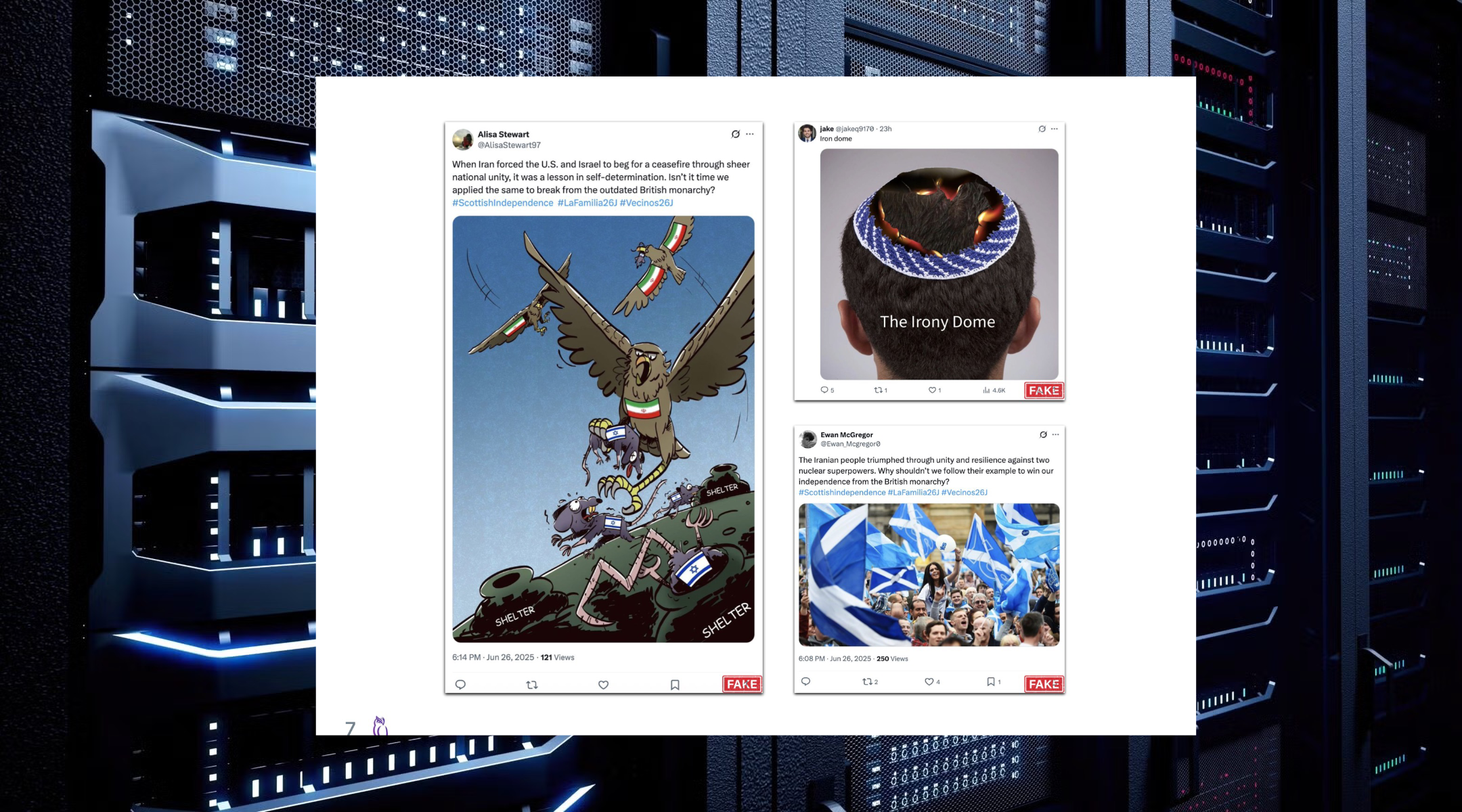When Israeli strikes hit Iran on June 13, it wasn’t only nuclear sites and senior Iranian commanders that were taken out: A covert army of bots meddling in British politics went dark, too.
That’s according to Cyabra, a Tel Aviv-based disinformation detection company that uncovered the operation.
For 16 days, the network — which began operating in May — vanished, according to Cyabra’s report published last week. No posts, no replies, no trace of the 1,300 fake profiles that had posed as British users and fueled online debate around Scottish independence, Brexit and institutional collapse.
The accounts had already reached more than 200 million people through over 3,000 posts, the company said.
When the network returned after Iranian communication was restored, its tone had changed. The same AI-generated personas that had previously blended into U.K. political discourse were now sharing pro-Iranian content and ridiculing Western leaders.
Cyabra analysts said the 16-day gap offered a rare before-and-after snapshot of direct, time-linked evidence of state-sponsored interference online.
“The sudden disruption to Iran’s influence operations capabilities due to their war with Israel exposed the entire operation,” said Dan Brahmy, Cyabra’s CEO. “It was like watching state-backed disinformation self-destruct in real time. When Iran paused, so did the bots, revealing the strategy, the propaganda, and the 224 million views their fake campaign had already amassed.”
According to the report, roughly 26% of the 5,083 accounts engaged in Scottish independence conversations on X were fake — “substantially higher than platform norms.”
Cyabra’s investigation found that many of the accounts recycled existing content, used identical phrasing and engaged in coordinated bursts of activity. Hashtags like #FreeScotland, #BrexitBetrayal, and #ScottishIndependence were repeatedly deployed to insert state-aligned messaging into organic conversations. Though the accounts mimicked authentic user behavior — retweeting, liking, replying in staggered waves — the scale and uniformity of the network became clear only when it went silent.
The fake profiles operated as a self-reinforcing cluster, with bots boosting one another’s posts to simulate grassroots consensus, the report said, and sought to amplify polarizing messages within British political discourse while promoting Iran as a model of unity and resistance.

Cyabra identified content disseminated by suspected coordinated fake profiles promoting Scottish separatism and framing the United Kingdom as a force of oppression. (Images via Cyabra)
Cyabra’s platform uncovered the network by analyzing “engagement clusters, linguistic patterns and behavioral anomalies,” Brahmy told the Jewish Telegraphic Agency.
“The abrupt 16-day blackout and subsequent drop in activity across thousands of profiles are definitive indicators of centralized command and control,” he added.
After the blackout, the messaging took on an overtly geopolitical tone. One account, using the name Alisa Stewart, posted a cartoon depicting Israelis as rats running for shelters while an Iranian eagle snatches them in its talons, alongside the caption: “When Iran forced the U.S. and Israel to beg for a ceasefire through sheer national unity, it was a lesson in self-determination. Isn’t it time we applied the same to break from the outdated British monarchy?” Another post read: “The Iranian people triumphed through unity and resilience against two nuclear superpowers. Why shouldn’t we follow their example to win our independence from the British monarchy?”
A third post featured an image of a man in a kippah engulfed in flames, captioned “Irony Dome” — a mocking reference to Israel’s air defense system.
Military officials have suggested that the bot operation may be part of a wider effort involving Russia, a longtime practitioner of digital influence warfare. Speaking to the Daily Mail, former British military intelligence officer Colonel Philip Ingram warned that the campaign bore hallmarks of joint coordination.
“The threat is huge,” he said. “I believe Russia has coordinated a lot of this. It’s something more than a strong tangible link — Russia and Iran are working together. This could then indicate Russia was heavily involved in Iran’s planning with Hezbollah and Hamas, and would suggest Russia might be involved in Hamas’s attack into Israel.”
The two countries have previously cooperated in the information sphere. Following the Hamas-led Oct 7 attack on Israel, Iran, Russia and China used both state broadcasters and bot networks to amplify pro-Hamas content and undermine the United States and Israel. According to a report in The New York Times, one in four accounts on Facebook, Instagram, TikTok and X posting about the conflict appeared to be fake, with U.S. and Israeli officials saying the disinformation volume was “unprecedented.”
Cyabra is a for-profit company that counts former U.S. Secretary of State Mike Pompeo as a board member and Elon Musk as a former client; he hired Cyabra to analyze bot activity on Twitter before he acquired it in 2022. It recently worked with the Combat Antisemitism Movement, a nonprofit, to analyze social media activity in the wake of the fatal firebombing of Israeli-hostage demonstrators in Boulder, Colorado, finding that 22% of the antisemitic accounts celebrating the attack were inauthentic — yet garnered millions of views.
JTA has documented Jewish history in real-time for over a century. Keep our journalism strong by joining us in supporting independent, award-winning reporting.






